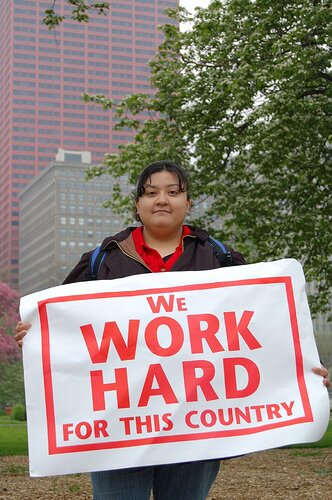By Victor Corral, Program Manager, Insight Center for Community Economic Development
The U.S. economy needs immigrants. According to the Center for American Progress, if we passed immigration reform that included legalization, there would be an estimated $1.5 trillion boost to U.S. GDP over 10 years. On the other hand, they note that pursuing an "enforcement-only" policy would cost us $2.6 trillion over 10 years. It's time we look at immigration not as a problem, but an opportunity to craft a policy that both recognizes that immigrants make valuable contributions to our economy and supports their ability to do.
Immigrants reflect the core American values of thrift, innovation and entrepreneurship. They stimulate the economy by starting businesses, creating jobs and spending money to the tune of $37 billion a year, according to the U.S. Council of Economic Advisers. Many of these gains are made by immigrant small businesses driven by innovative entrepreneurs. For example, in the 1990s, while microenterprises grew by 3.9 percent for the general population, Hispanic-owned microenterprises grew by 30 percent, and Latina-run small businesses took in $29.4 billion in receipts and employed 198,000 workers. Yet many immigrant businesses lack access to affordable loans and credit to grow. Were they given adequate support like most business, they could leverage their cultural capital and transnational connections to reach new markets and expand their businesses.
Reform to build a more inclusive economy is not just about legalization. Even for documented immigrants barriers to economic security and opportunity are pervasive, so turning work into wealth is elusive. Immigrants tend to work in jobs without health or retirement benefits, essential elements of the "wealth escalator," and while many of them pay taxes, they are ineligible for many public benefit programs they help to support. In addition, their daily demands, their low-wage jobs, and language barriers often make higher education prohibitive, and job-training programs to get them into living-wage jobs are often non-existent.
Were we to create a common sense economic policy that brought immigrants and their businesses into the mainstream, it would speed economic recovery, and their taxes could help stabilize programs like Medicare and Social Security as former President Bill Clinton recently noted. We've done it before, and we could do it again. In fact, for much of American history, immigrants from European countries had no trouble flexing their entrepreneurial muscles and realizing their economic potential. Immigrants today are working just as hard, but facing greater obstacles. We've seen over the last several decades that as immigrants have gotten darker, immigration policy has gotten harsher. This doesn't just stifle the immigrant's ability to succeed, but our country's as well.
The recently signed Arizona Senate Bill 1070 allows law enforcement agencies to question anyone suspected of being undocumented and requires them to show proof of citizenship, or risk arrest and deportation. Besides violating basic human rights and legalizing racial profiling, this policy will likely cause many businesses run by immigrants or where immigrants work to suffer, possibly close or relocate potentially costing Arizona and its citizens millions in revenue. Unless the state and the rest of the country switch from a policy of deportation and enforcement to one that facilitates legalization and economic inclusivity, our economy will suffer and real recovery will be delayed.
The United States finds itself at a political choice point. Will we give in to the old politics that would maintain America as a country for whites? Or do we recognize that it is a nation of immigrants, including people from beyond Europe, and provide them the tools they need to succeed? The issue of immigration is at the intersection of race, the economy, and our future ability to compete in the global marketplace. What path will we take?
Photo credit Elaine Thompson, AP
Victor Corral , Program Manager, Insight Center for Community Economic Development's Closing the Racial Wealth Gap Initiative, a national effort to close the racial wealth gap for the next generation. Victor co-leads the Initiative's policy and media strategy in an effort to expand the reach of the Initiative's work and ensure that experts of color shape national and local economic debates.




